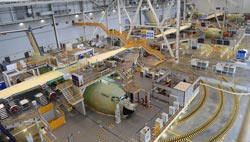Factories of the future: Mobile manipulators for aerospace production

Aircraft production at Airbus. Autonomous robots will also be used in equipment production in the future. (c) Airbus-Military<br>
VALERI is the name of the project that was initiated and now coordinated by the Fraunhofer Institute for Factory Operation and Automation (IFF) in Magdeburg, Germany. Together with their industrial partners, Airbus Military, FACC, IDPSA, and KUKA Laboratories GmbH, and their research partners PROFACTOR GmbH and PRODINTEC, the robotics specialists want to make their vision a reality. VALERI stands for “Validation of Advanced, Collaborative Robotics for Industrial Applications”. Within three years, the consortium plans to develop applications and test mobile robots that will later be integrated in the production of aerospace components.
The trick is for the robots to be able to work side by side next to humans, without separating barriers between them, so they can take over monotonous jobs and free their co-workers up for more value-added work. The project is supported by the European Commission under the FP7 “Factories of the Future” Public-Private Partnership. This partnership is designed to help increase the competitiveness of European companies through the development of technological know-how, and ultimately contribute to keeping manufacturing jobs in Europe.
More flexibility and higher speeds
In the production where the robot is planned to be used, large parts are worked on in a stationary production cell. Over a period of days, multiple shifts of workers complete the assembly and inspection tasks. In such a production environment, specialized, stationary robotic systems are not economical. The employment of mobile manipulators is a means for achieving economical application, by allowing for one robot to be used for similar tasks in multiple stations. The planned robot system has, in comparison to traditional industrial robots, lower programming times, leading to increases in both speed and flexibility.
Complex Challenges
The project aims to carry out two exemplary tasks that have been identified as strategically important for their production, namely carrying out inspections on large surfaces (e.g. covering elements) and applying sealant along a groove. These tasks are carried out in variations at virtually all assembly stations, so it is expected that the final system will be highly productive.
Within VALERI, the project partners are developing a system that is both an adaptive and flexible aid in the production of craft and small batch parts. That makes it interesting for aerospace production as well as for other manufacturing sectors.
Media Contact
All latest news from the category: Machine Engineering
Machine engineering is one of Germany’s key industries. The importance of this segment has led to the creation of new university degree programs in fields such as production and logistics, process engineering, vehicle/automotive engineering, production engineering and aerospace engineering among others.
innovations-report offers informative reports and articles covering technologies such as automation, motion, power train, energy, conveyor, plastics, lightweight construction, logistics/warehousing, measurement systems, machine tools and control engineering.
Newest articles

NASA: Mystery of life’s handedness deepens
The mystery of why life uses molecules with specific orientations has deepened with a NASA-funded discovery that RNA — a key molecule thought to have potentially held the instructions for…

What are the effects of historic lithium mining on water quality?
Study reveals low levels of common contaminants but high levels of other elements in waters associated with an abandoned lithium mine. Lithium ore and mining waste from a historic lithium…

Quantum-inspired design boosts efficiency of heat-to-electricity conversion
Rice engineers take unconventional route to improving thermophotovoltaic systems. Researchers at Rice University have found a new way to improve a key element of thermophotovoltaic (TPV) systems, which convert heat…



